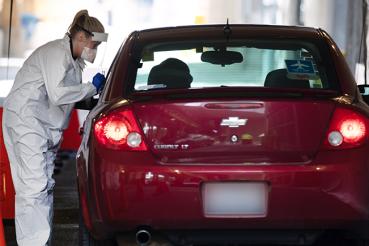Amid news that COVID-19 cases are rising among children, it’s normal to be concerned when your kid starts coughing. We asked Colleen Nash, MD, MPH, a pediatric infectious disease specialist at Rush University Medical Center, which COVID-19 symptoms to look for and what to do if your kid has them.
What are the symptoms of COVID-19 in children?
Signs of COVID-19 are similar in adults and children. They include:
- Fever
- Tiredness
- Cough
- Sore throat
- Snuffy or runny nose
- Loss of taste or smell
- Headache
- Muscle aches
- Shortness of breath
- Belly pain
- Diarrhea
- Vomiting
- Loss of appetite
However, some children with COVID-19 may not have any symptoms.
My kid has the sniffles. How do I know if it’s a cold or COVID-19?
The only way to know if your child has COVID-19 is with a test. Testing as soon as symptoms start is the easiest way to get on top of an infection and prevent further transmission, especially if you’re thinking about sending your child to school.
When should I reach out to my kid’s doctor?
If your child tests positive or if you are concerned your child may have COVID, having a video visit with your child’s doctor can help you determine the next steps.
If your child is sick, you’ll want to keep them at home and make sure they get plenty of fluids and rest. A pain reliever like acetaminophen can help reduce a fever and ease aches. Keep an eye on their symptoms and reach out to your child’s doctor if you have concerns.
But aren’t most cases of COVID-19 in kids fairly mild? And isn’t the current omicron variant associated with milder COVID-19?
There is some data to suggest that the omicron variant can produce less severe disease, particularly in patients who are vaccinated. But we have to remember that pediatric-specific data isn’t available yet, and we also have a huge pediatric population that hasn’t been vaccinated because they are too young. So, we just don’t have all of the information yet.
What we do know is that the omicron variant is highly transmissible. Over the past few weeks, we’ve seen a pretty remarkable increase in the number of pediatric hospitalizations associated with this current wave of COVID, both on our general pediatrics floor and within our intensive care units. Most of the cases that we’re seeing that require hospitalization are in children who are too young to be vaccinated or those who are old enough and just haven’t been vaccinated.
What is MIS-C?
We know that children can suffer severe illness after COVID-19. Specifically, they can develop multisystem inflammatory syndrome in children (MIS-C), a rare but severe and sometimes fatal illness that can be hard to diagnose before it becomes serious. Children with MIS-C have inflammation throughout the body that affects multiple organ systems at the same time.
MIS-C can appear approximately three to five weeks after an acute COVID infection and can cause a host of severe symptoms that require hospitalization and ICU-level care. Sometimes children with MIS-C need a breathing tube, sometimes they need blood pressure medications and other treatments to support them through their acute illness.
What are the warning signs of MIS-C?
MIS-C can produce different symptoms in different children. Some children may not have any visible symptoms. But those that are visible include:
- Fever
- Belly pain
- Vomiting
- Diarrhea
- Headache
- Body aches
- Bloodshot eyes
- Swelling of the hands and feet
- Skin rash
If your child has these symptoms, get medical help right away. Blood and imaging tests can help determine if your child has MIS-C.
Do kids really need to get vaccinated against COVID-19?
Children definitely need the COVID-19 vaccines as soon as they are age-eligible. That means any child age 5 and older should be vaccinated. And if your child is eligible for a booster, get them boosted. The Centers for Disease Control and Prevention recently recommended Pfizer boosters for anyone ages 12 and older at least five months after their initial series of shots, or for those children down to age 5 who are immunocompromised.
We have seen through many different studies that the vaccines help protect children in many different ways. They can help prevent severe infection. They can help prevent hospitalizations and prevent a child from going to the ICU. And they can prevent ongoing transmission to others.
How else can I protect my kid against COVID-19 during the current surge?
It’s really important to maintain those foundational principles that we’ve been relying upon throughout this pandemic. This includes handwashing, social distancing and wearing masks that fit well over the mouth and nose. A well-fitting mask is exceedingly important to prevent transmission, especially in a setting like school where teachers can’t police mask-wearing at all times. Sending children to school with an additional mask or two so they can replace their mask when it gets soiled is also helpful.
The same practices are important for other activities outside of the classroom, such as sports or other extracurricular activities. Whenever prevention strategies break down in those settings, there’s a potential for transmission.
And because adults who are unvaccinated can bring COVID into a household, we recommend that everyone who is eligible be vaccinated and boosted.
Learn how to get your child vaccinated and boosted.




